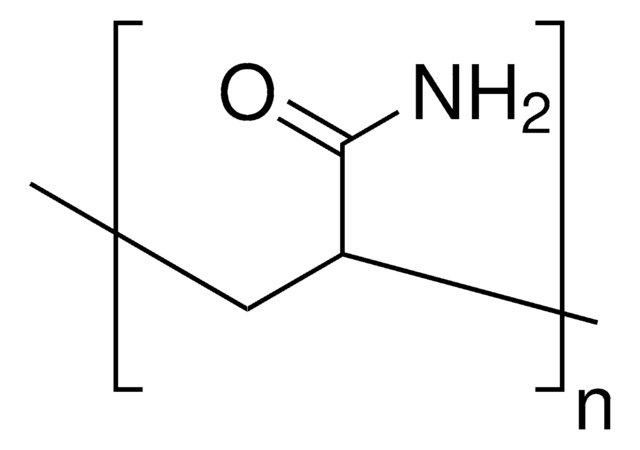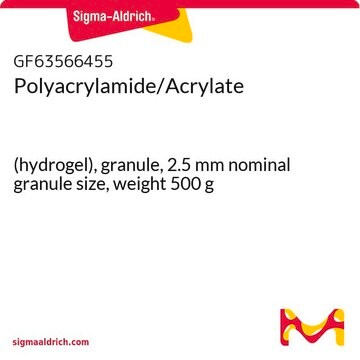738743
Polyacrylamide
average Mn 40,000
Synonyme(s) :
PAM
Se connecterpour consulter vos tarifs contractuels et ceux de votre entreprise/organisme
About This Item
Formule linéaire :
(C3H5NO)n
Numéro CAS:
Numéro MDL:
Code UNSPSC :
12162002
Nomenclature NACRES :
NA.23
Produits recommandés
Forme
powder
Niveau de qualité
Poids mol.
average Mn 40,000
Pf
246-250 °C
Température de transition
Tm 246-250 °C
InChI
1S/C3H5NO/c1-2-3(4)5/h2H,1H2,(H2,4,5)
Clé InChI
HRPVXLWXLXDGHG-UHFFFAOYSA-N
Vous recherchez des produits similaires ? Visite Guide de comparaison des produits
Application
- Proteomic analysis and lethality of the venom of Aegaeobuthus nigrocinctus, a scorpion of medical significance in the Middle East.: This study utilized polyacrylamide gel electrophoresis (PAGE) to analyze the protein composition of the venom, providing insights into its biochemical properties and potential medical applications. The results highlight the importance of PAGE in venom proteomics and its relevance in biomedical research (Borges et al., 2024).
- One-Dimensional Acrylamide Gel Electrophoresis for Analysis of Plant Samples.: This paper describes the methodology of using PAGE for the analysis of plant proteins, demonstrating its utility in biochemistry and molecular biology studies. The technique is essential for separating and identifying proteins in complex mixtures, underscoring its significance in research and development in the life sciences (Marzban et al., 2024).
- Protocol for isolating small cytosolic dsDNA from cultured murine cells.: The study outlines a detailed protocol incorporating PAGE for the isolation and analysis of small cytosolic dsDNA from murine cells. This method is pivotal for research in molecular and cellular biology, facilitating advancements in genetic and biomedical studies (Dai et al., 2024).
- Comparative study of the commonly used protein quantitation assays on different Hymenoptera venoms: A fundamental aspect of Hymenoptera venom proteome analysis.: This research compares various protein quantitation assays, including PAGE, to analyze Hymenoptera venoms. The findings underscore the critical role of PAGE in proteomic analysis and its application in toxinology and biomedical research (Wanandy et al., 2024).
- Proteomics and Its Current Application in Biomedical Area: Concise Review.: This review highlights the applications of proteomics, including PAGE, in biomedical research. It discusses the advancements and future directions in the field, emphasizing the importance of PAGE in proteomic studies and its contributions to biomedical science (Gobena et al., 2024).
Code de la classe de stockage
11 - Combustible Solids
Classe de danger pour l'eau (WGK)
WGK 2
Point d'éclair (°F)
Not applicable
Point d'éclair (°C)
Not applicable
Faites votre choix parmi les versions les plus récentes :
Déjà en possession de ce produit ?
Retrouvez la documentation relative aux produits que vous avez récemment achetés dans la Bibliothèque de documents.
Les clients ont également consulté
D J King et al.
Reviews on environmental health, 8(1-4), 3-16 (1989-01-01)
The purpose of this paper is to present information gathered regarding, in general, the physical characteristics, and, in particular, the possible toxic nature of polyacrylamide A short discussion of the properties and toxicity of the acrylamide monomer is also included.
Sachio Yamamoto
Yakugaku zasshi : Journal of the Pharmaceutical Society of Japan, 132(9), 1031-1035 (2012-10-02)
Microchip electrophoresis is widely used for microfluidics and has been studied extensively over the past decade. Translation of capillary electrophoresis methods from traditional capillary systems to a microchip platform provides rapid separation and easy quantitation of sample components. However, most
N V Bovin
Bioorganicheskaia khimiia, 22(9), 643-663 (1996-09-01)
The synthesis, physicochemical characteristics, and application for studying the carbohydrate-binding molecules of some analogues of human cell glycoconjugates, neoglycoconjugates, were reviewed. An approach to the synthesis of the polyacrylamide derivatives of carbohydrates based on the interaction of fully activated polyacrylic
Imran Khimji et al.
Methods (San Diego, Calif.), 64(3), 292-298 (2013-08-28)
Biosensors are devices that can provide quantitative or semi-quantitative analytical information about target molecules, where molecular recognition is based on biomolecular interactions. In recent years, DNA has emerged as a useful molecule for biosensor development since DNA can not only
E A Smith et al.
Reviews on environmental health, 9(4), 215-228 (1991-10-01)
Acrylamide is a highly water soluble vinyl monomer formed from the hydration of acrylonitrile. The major commercial use of acrylamide is the formation of polymers. In the environment acrylamide has a high mobility in soil, may travel great distances in
Notre équipe de scientifiques dispose d'une expérience dans tous les secteurs de la recherche, notamment en sciences de la vie, science des matériaux, synthèse chimique, chromatographie, analyse et dans de nombreux autres domaines..
Contacter notre Service technique






